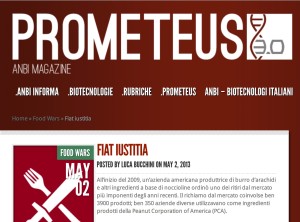This column initially appeared in the Italian publication, On promoteus, where food safety friend and consultant Luca Bucchini has a weekly column called Food Wars. An edited version appears below.
In early 2009, an American manufacturer of peanut butter and other peanut-based ingredients such as paste, ordered one of the most impressive recalls in recent years.
The recall involved 3900 products, since as many as 350 different companies used ingredients by the Peanut Corporation of America (PCA).
It was not precautionary action: the contamination of peanut butter with Salmonella Typhymurium was already spreading infection and death across  United States. According to estimates, at least 714 people were eventually sickened, alog with nine deaths.
United States. According to estimates, at least 714 people were eventually sickened, alog with nine deaths.
Investigations later showed that PCA had obtained analytical results from external laboratories that confirmed the presence of the pathogen earlier than the recall was ordered, but managers decided to ignore them and hide them from their customers. Management even went so far as to invent false analytical results, altering those with unwelcome results and inventing results of tests never made.
If all this is true, it is difficult to disagree with the intention of the U.S. Department of Justice to prosecute and potentially have those responsible jailed. Meanwhile, PCA is bankrupt, and some managers have since explained that financial concerns contributed to a delayed recall and falsified results.
Leaders of food companies are sometimes, though rarely, forced to make a choice: consumers’ lives or corporate survival.
That decision is influenced by moral fiber, courage, and legal incentives.
If a similar case occurs in the Belpaese (Italy, aka the beautiful country), two things are likely to happen. First, if cases were not very concentrated geographically, and the number of cases were a bit less dramatic, from the epidemiological side (epidemiologists collect data on cases of disease and try to interpret them, but they must have an effective surveillance system to do their job) there would be no alert. Second, if the contamination had become known somehow by the authorities, with or without illness, managers would have faced criminal charges.
In Italy’s system, with a few recent exceptions, a company’s relevant manager is criminally responsible for the contamination of food, regardless of causes. European food law imposes a duty on same manager to immediately report to the authority and to take action to recall food as soon as he or she discovers that their food, despite all efforts, is found to be contaminated.
Since for the Italian mentality, prevention is less important than doling out punishment for cases of the disease, who communicates to authorities that their company’s food is contaminated may bring upon herself or himself a criminal trial.
It is not uncommon to hear QA managers of food companies (to whom legal responsibility has been prudently delegated by higher management) quietly say when in confidence: I would not do it. I’m pretty convinced that, when there is evidence of cases of illness, all would agree to “fall on their sword” and risk criminal charges but rarely, when you have early analytical results, you know with certainty that one of your products is causing illness and sometimes death.
The result is that the incentives in Italy are still too much in favor of providing the public the satisfaction of the pillory, in the rare cases where authorities found that there has been an issue, and not in favour of protecting people’s health.
When draconian laws are urged, does this system favors investment in better detection techniques given the dilemmas posed by to managers when they learn that their own food is contaminated, or does it encourage inertia.
When I think that, in Italy, a manager of a supermarket can be treated as a criminal because the supermarket he supervises unwittingly sold a sausage laced with Salmonella (even if manufactured by another business and even if it is virtually impossible to test each received batch), I much admire those who, if they are aware of the risks, continue to assume responsibility in the food sector.
